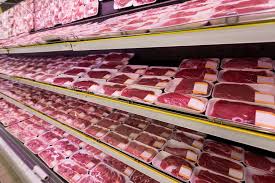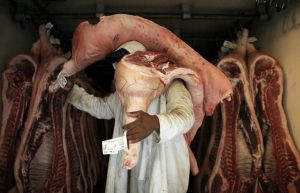I’ve always believed in don’t complain, create.
When I didn’t like the university newspaper I was editor of, I created my own (along with others).
 When I didn’t like my higher education, I created my own path to a PhD.
When I didn’t like my higher education, I created my own path to a PhD.
I created my own professoring job (with lots of help from others) and have sorta done my own thing.
So while I’m somewhat beaten with the broken ribs, I still have some spirit.
With Listeria-in-cantaloupe spreading across Australia, I got excited and wrote an op-ed on Monday before lunch.
Amy edited, just like the old days, and I sent it off to the Sydney Morning Herald.
They said they were interested and then … nothing.
Today, with news of a fourth death and more illnesses, I asked again if they were interested.
Nothing.
That’s cool, I have a nostalgia for print and the smell of ink, and I have no doubt why print is vanishing.
That’s one reason why we made our own publishing outlet, barfblog.com, in 2005 because, “Freedom of the press is guaranteed only to those who own one” (A. J. Liebling).
Here’s the op-ed. And yes, PR flunkies should be paying me for this advice.
On Sept. 9, 2011, reports first surfaced of an outbreak of Listeria linked to cantaloupe – known as rock melons in Australia — grown in Colorado. Already two were dead and seven others sick.
By the end of the outbreak, 33 people were killed and at least 140 sickened.
On Aug. 17, 2012, the U.S. Centers for Disease Control announced an outbreak of Salmonella linked to cantaloupe that ultimately killed three people and sickened 270 in 26 states.
In Australia, a fourth death has now been linked to the Listeria-in-rockmelon outbreak, and the number of sick people has risen to 13.
Already, an Australian rockmelon grower is saying “misinformation” about the listeria outbreak will have a negative impact on growers.
Rather than misinformation, there is a lack of information required to regain consumer confidence and trust.
Sadly, the number of dead and sick will probably grow, because Listeria has an incubation period of up to six weeks. The melon you ate five weeks ago could make you sick with listeriosis tomorrow.
This is not misinformation, it’s biology.
Australian media reports that the Listeria contamination is on the rockmelon surface but I have yet to see any verification of that statement. Under a microscope the exterior of a rockmelon looks like a lunar surface of hills and craters, a soft porous skin which microbes can easily cross.
Regardless of how careful a consumer is while cutting rockmelon, bacteria like Listeria, on the outside or inside, are going to be in the final product.
This means everything has to be done to reduce the risk of contamination beginning on the farm.
On a trip to the local Woolies this morning, I found no rockmelon, however some was available in fresh-cut mixed fruit packages. Shouldn’t those also have been pulled? I asked a stocker where the rockmelons were and he said there were none because of the recall. There was no information posted in the shelf-space that previously held rockmelon.
 Us mere mortals, those who like rockmelon, have no information on the size of the farm involved in the outbreak, how often water was tested for dangerous bugs, what kind of soil amendments like manure may have been used, whether the melons went into a dump tank of water after harvest to clean them up, whether that water contained chlorine or some other anti-microbial and how often that water was tested, whether there was a rigorous employee handwashing program, whether the crates the melons were packed in were clean, whether melons were transported at a cool temperature (won’t help with Listeria, it grows at 4 C), and so on.
Us mere mortals, those who like rockmelon, have no information on the size of the farm involved in the outbreak, how often water was tested for dangerous bugs, what kind of soil amendments like manure may have been used, whether the melons went into a dump tank of water after harvest to clean them up, whether that water contained chlorine or some other anti-microbial and how often that water was tested, whether there was a rigorous employee handwashing program, whether the crates the melons were packed in were clean, whether melons were transported at a cool temperature (won’t help with Listeria, it grows at 4 C), and so on.
These are the basic elements of any on-farm food safety program, which my laboratory started developing over 20 years ago for fresh produce in Canada.
These are the questions that need to be answered by any supplier of rockmelon before I would buy again.
The 2011 and 2012 U.S. outbreaks were the result of familiar factors to food safety types: seemingly minor issues synergistically combined to create ideal conditions for Listeria or Salmonella to contaminate, grow and spread on the cantaloupe. There was no overriding factor, and there is no magic solution, other than constant awareness and diligence to the microorganisms that surround us.
Eric Jensen, the fourth-generation produce grower at the centre of the 2011 Listeria-in-cantaloupe outbreak told a reporter once the outbreak was “something Mother Nature did. We didn’t have anything to do with it.”
I’ve yet to see divine intervention as a cause of foodborne illness. Instead, illnesses and outbreaks are frighteningly consistent in their underlying causes: a culmination of a small series of mistakes that, over time, results in illness and death. After-the-fact investigations usually conclude, why didn’t this happen earlier, with all the mistakes going on?
So while retailers ask themselves, why did we rely on such lousy food safety assurances, it would bolster consumer confidence if there was any public indication that Australian rockmelon growers had learned anything from past outbreaks, at home and abroad.
(A table of rockmelon-related outbreaks is availabe at https://barfblog.com/wp-content/uploads/2014/06/Cantaloupe-Related-Outbreaks-8-12.xlsx. In Oct. 2006, 36 Australians were sickened with Salmonella in rockmelon).
Tying a brand or commodity – rockmelon, lettuce, tomatoes, meat — to the lowest common denominator of government inspections is a recipe for failure. The Pinto automobile also met government standards but that didn’t help much in the court of public opinion.
The best growers, processors and retailers will far exceed minimal government standards, will proactively test to verify their food safety systems are working, will transparently publicize those results and will brag about their excellent food safety by marketing at retail so consumers can actually choose safe food.
Dr. Douglas Powell is a former professor of food safety at Kansas State University who publishes the food safety blog, barfblog.com from his home in Brisbane.
0478222221
dpowell29@gmail.com
 Meanwhile, the food safety watchdog has checked all establishments of the Verbist Group in Belgium.
Meanwhile, the food safety watchdog has checked all establishments of the Verbist Group in Belgium.









